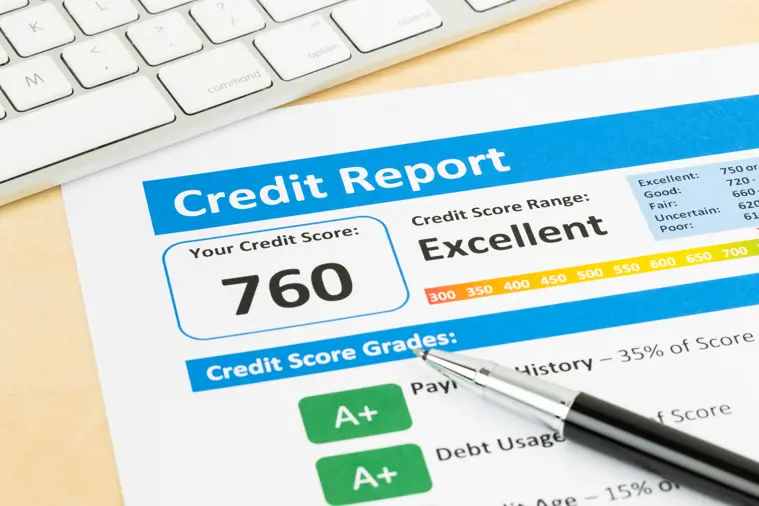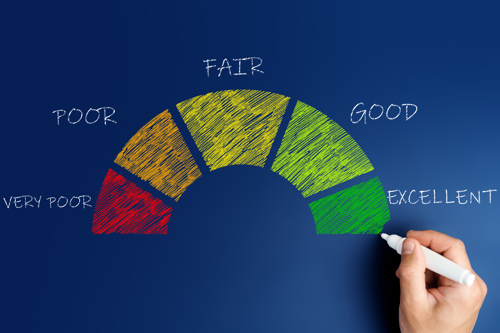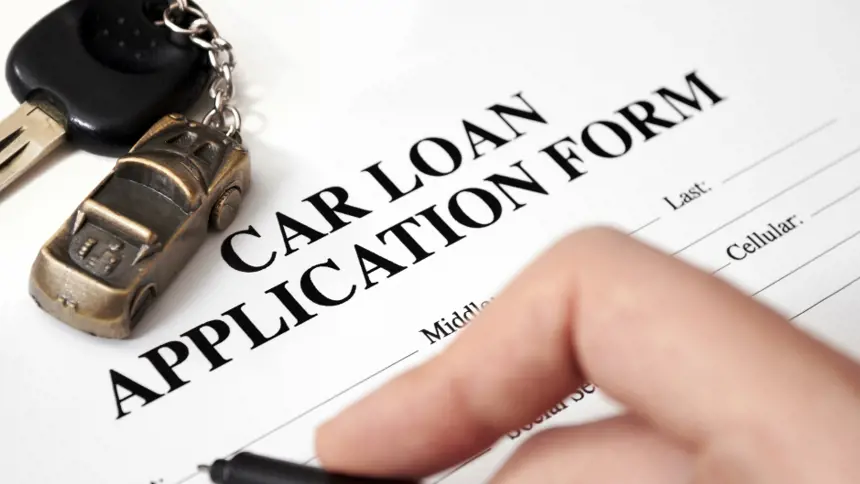How to check your credit score
Looking to check your credit score to find out whether you're eligible for the best car finance deals? Here's how you can do it

'Credit score', 'credit rating', 'credit file', 'credit history'... There are definitely plenty of terms that ultimately refer to your financial history and your ability to get credit, and one of the key factors used to decide whether you're eligible to take out finance and what interest rate you're likely to get is your credit score.
Whether or not you have taken out finance in the past, you will have a credit score. This score is used as a measure of the likelihood of you making future finance payments on time, based upon your past behaviour. This means that if you've never used finance - or have only borrowed a couple of times - it's harder for finance companies to gauge how likely you are to pay them back - in full and on time.
As a result, if you have only borrowed very little, if anything, in the past, you will have a ‘thin’ credit file. If this is the case you'll probably have to borrow money on a few smaller things to build up your credit history and be in a better position to take advantage of the best car finance deals. Click to find out how to build up your credit history and secure car finance in future.
Credit scores are calculated by three main 'credit reference agencies' - TransUnion, Experian and Equifax - each of which has its own ratings scale. This means you have no single, universal credit score. Instead there are three - each on a different scale. Once you know how each company’s rating system works, it’s clear where you stand with them and companies that rely on their score.
How so? Because you can check your credit scores - and for free, too. Keep reading to find out how. Once you know what your credit score is, check back here to read our story to gauge whether your credit score is good enough to take out car finance.
How can I check my credit score?
We all have the right to see our credit file but, depending on the credit reference agency, the level of access you’re offered will vary and may come at a price. With some agencies, one way to see everything for free - both your score and your report - is to sign up for a 30-day trial and then cancel it before the charging period begins.
Experian offers this option through its CreditExpert service, though you can see your credit score, on its own, for free. If you continue with the offer (access costs £14.99 per month) you’ll also get alerts every time your credit file is updated. Experian claims that this service helps you to improve your score, too, using its personalised tips.

Equifax offers a similar deal, although after the free trial ends, the charge is £7.95 per month. Alternatively, you can access your Equifax score and report for free, for life, through ClearScore - a separate UK-based financial business.
Meanwhile, you can see your TransUnion credit score and report for free through the agency’s CreditKarma service. This means there are a number of simple ways to check your credit with the three main credit reference agencies.
But what if you don’t want the hassle of contacting each agency in turn? One of the simplest ways to check your scores and reports held by all three agencies is to use Check My File. This is free for the first 30 days and then £14.99 per month thereafter, you can cancel at any time.
How do the credit score bands work?
The three credit reference agencies use different scales for assessing your eligibility for credit. However, with all of these you'll have a specific credit score - a number that represents your exact risk to lenders - and fall into one of the broad credit rating bands. Which scores fall into the respective credit bands differ between the three main agencies, though bands for all of them range from Very Poor to Excellent.
Those in the Excellent band have the greatest chance of being approved for finance and are likely to be eligible for the best finance deals with the lowest APR charges (with APR representing the amount of interest and other charges issued for taking out finance). To take advantage of interest-free credit it's likely you'll need to have a strong credit score.
TransUnion’s ratings range from 0 to 710, while Experian’s vary from 0-999 and Equifax’s scores span from 0-700. The higher the number, the better your credit score and the more likely you are to be approved for finance and to be able to take advantage of the best low-interest offers. They are split up as follows:
TransUnion:
- 0-550: Very Poor (Any applications for credit are very likely to be turned down)
- 551-565: Poor (You may be accepted, but expect higher interest rates and lower borrowing limits)
- 566-603: Fair (Expect to be offered reasonable interest rates, but with limits on how much you can borrow)
- 604-627: Good (It's likely you'll be approved, but you may not be offered the lowest interest rates)
- 628-710: Excellent (It's very likely you'll be approved and the lowest interest rates should be available)
Experian:
- 0-560: Very Poor (It's highly likely you'll be turned down for most credit cards, loans and mortgages)
- 561-720: Poor (You might be approved but you can expect to have to pay higher interest rates)
- 721-880: Fair (Reasonable interest rates may be available, but your credit limit may not be very high)
- 881-960: Good (Most offers should be available to you, though potentially not the very best deals)
- 961-999: Excellent (You should be able to take advantage of the best deals, though it's not guaranteed)
Equifax:
- 0-279: Very Poor (There's a high likelihood that any credit applications you make will be turned down)
- 280-379: Poor (You may be approved but can expect to be charged high interest rates with low credit limits)
- 380-419: Fair (You can expect to be offered reasonable interest rates, but are likely to have a low credit limit)
- 420-465: Good (It's probably you'll be approved, though you may not be offered the best interest rates)
- 466-700: Excellent (You should be approved for credit, with the best interest rates likely to be available)
How is the credit score calculated?

Your score is based on your past credit performance but even a simple slip such as recently missing a monthly payment can cost you a lot of rating points. Not being on the electoral roll - meaning you are not registered to vote in an election - making too many loan applications, having a county court judgement against you (which may be issued if you've failed to pay a fine, for instance), and being linked to someone with a poor score can also affect your score negatively.
Fortunately, though, that's not all that lenders have to go on. They’ll also look at your file, rather than just take your score at face value, and consider your past dealings with them. They also rely very much on the information you provide on the application form, so be sure to get vital things such as your salary right, because this information is not held on your credit file and could make a big difference to your chances of getting a loan.
Why do I need to know my credit score?
If you’ve never struggled to get a loan, take out a credit card or be accepted by any number of suppliers offering repayment terms, you probably think checking your score is something that only those less fortunate than you need to do. However, lenders work in mysterious ways and as the finance industry becomes smarter with its lending, it pays to know what your scores are in case they’re not as high as you think.
For example, increasingly, lenders charge people a higher interest rate instead of just turning them down as they might have done in the past. It’s why they use the term ‘representative rate’ when quoting example rates in their advertising. More than half of borrowers must be offered the advertised rate but the rest who are also accepted but deemed as not being credit-worthy will probably be offered a much higher one.
This ‘rate for risk’ approach applies when you look for a car on BuyaCar. When you’ve found the car you’re interested in, click on it. At the bottom of the page, you’ll see BuyaCar’s budget calculator. On the last line, you can choose the credit rating that applies to you. It’s a general guide only but you can see how the interest rate and your monthly payment change when you scroll through ratings.
Finally, be aware that if you've never had to borrow money before, it's likely that your credit score is not that high. This isn't because lenders think that you're not capable of paying them back but because they don't have any evidence to go on. Another person who may have taken out a number of loans over the last decade and pay them all back promptly and in full, however, should have a strong score in comparison, as they've proven that they can be relied upon to pay back money borrowed.
What is a hard search?
It sounds like a desperate hunt for that elusive piece of jewellery lost down the back of the sofa but a ‘hard search’ is a type of credit check that will show in your credit file. A credit file is the record that lenders such as banks and finance companies refer to when deciding whether to lend you money and if they do, at what interest rate.
This differs from a 'soft search' that merely gives you an indication of whether you're likely to be approved for finance and potentially what interest rate you may be eligible for, but doesn't leave a trace on your credit report. Read on to discover more and click on the link below to get a feel for your likelihood of being approved.
Is having a hard search on my credit file an issue?
This can be an issue as, to a credit reference agency, a hard search represents a loan application. It suggests you’re borrowing money - and therefore less able to pay back an additional loan - and this can reduce your credit rating by up to 10 points.
That’s fine if the initial search and application results in you taking out a loan but shop around and trigger another hard search or multiple ones and to the reference agencies it looks as though you are taking out multiple loans, perhaps because you’re struggling to make payments on the existing ones.
Immediately, your credit rating is lowered further still to the point that you may find it difficult or even impossible to borrow money. Six hard searches in quick succession is considered too many by lenders, since research has shown that people who have triggered them are eight times more likely to file for bankruptcy.
When is a hard search made?
It’s not only loan applications that trigger hard searches. A mortgage application does, as also does a credit card application. In addition, a hard search might simply be triggered by a new phone or internet contract.
That means that when getting quotes for any of these, it's best to understand whether what you're doing will result in a soft search or a hard search, as it could affect your ability to get credit.
When is it okay to have a hard search made?
Only when you are sure you can afford the loan, that you really need it and that the advertised interest rate and terms and conditions are competitive, should you make a formal loan application, which will trigger a hard search.
If you're still shopping around or not sure whether you really need that finance, it's best to stick to soft searches.
How long is a hard search recorded on my file?
Depending on your credit record, a hard search can stay on your file for up to 12 months. However, as long as in all other respects your record continues to show you’re a responsible borrower, its impact will decline fairly quickly and your credit rating will start to return to where it was.
How can I avoid making a hard search?
Unfortunately, when making a loan application, there’s no avoiding making a hard search, so postpone making one if all you want to do is find out whether your lender or phone supplier, for example, might accept you.
For this purpose you should use a soft search such as an eligibility checker that does not appear on your credit record. This gives you an idea of the best value option that you should be eligible for, without potentially damaging your credit rating.
Another way to check your credit status and ability to borrow money without compromising your credit record or rating with a hard search is to check your credit record yourself, which you can do through a company such as ClearScore.
This shows you which credit band you're in, so you can get a feel for whether you have a higher score and are likely to have a good choice of low-interest options, or have a worse score and may want to try to improve your score before applying out finance.
What is a soft credit search?

Unlike a hard search, this type of search is not as in-depth or as formal. As a result, though it is still noted on your credit history, it cannot be seen by other lenders and will not affect your credit score. A company might do it to find out if you’re eligible for certain deals, rates or offers.
If you are eligible, you may be granted pre-approval for a loan, meaning you know where you stand and can then set about choosing a car, for example, that fits your budget.
When you check your own credit history, perhaps to find errors in it, this, too, is recorded as a soft search.
When can a car finance soft search be seen?
Insurance companies may be able to see searches made by other insurers, and if you grant a debt settlement company access to your report, it may share its enquiries with companies you owe money to.
However, whether it can be seen or not, the fact remains that you can make any number of soft searches without affecting your credit history or creditworthiness. This means that when shopping around for the best deal, you want to make sure that only soft searches are being carried out every time you get a quote.
Car finance soft search: is it safe?
It is but you can be even safer by initially using online calculators to establish how much monthly payments are likely to be. Do this to find the best car for your budget and you can then find a specific quote on the car you choose.
Also, protect yourself by checking that the credit search a company is making is soft and not hard. Letting them know you know the difference between these two types of search will certainly get their attention.
How can I protect my credit score?

When researching loan costs and affordability, use online loan calculators (remember that your specific credit rating will affect factors including how much you can borrow and the interest rate you're charged) rather than making formal loan applications that will count as multiple hard searches.
If you must make multiple loan applications, space them out at the rate of one every three months to reduce their impact on your credit score. This means planning ahead of when you need to borrow money to avoid numerous hard searches in a short space of time.
Check that your credit history contains no errors and, in particular, hard searches carried out by fraudsters. If you find any, have them deleted by the relevant credit rating agency.
Make sure your finances are in good shape by paying off debts, including credit card debt, and by paying bills on time. Also make sure that you’re on the electoral roll - meaning you're registered to vote - as this improves your chance of getting credit. This work will trickle down to your credit history in time and your rating should improve.
How can I boost my chances of getting a loan?
In addition to tidying up your finances which, in time, will improve your credit rating, consider borrowing a smaller amount of money, either by putting down a larger deposit or buying a cheaper car. Note that a lender is unlikely to approve a loan where you have to pay back more than 25% of your net salary each month.
Remember that a lender can see your credit file so do not be over-ambitious or ignorant about your financial affairs, including income and expenses, the value of outstanding loans and monthly repayments, and the presence of any county court judgements against you.
